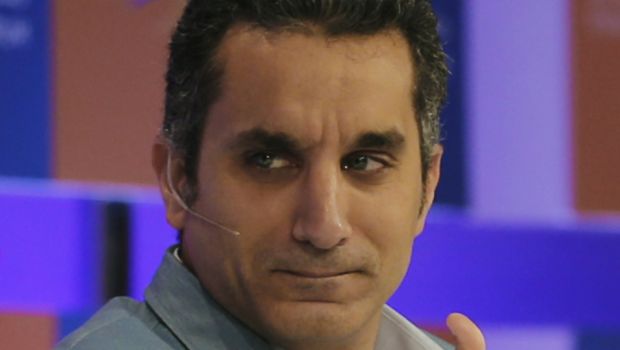
A file picture taken on May 15, 2013, shows Egyptian satirist and television host Bassem Youssef gesturing during the annual Arab Media Forum in Dubai. (AFP PHOTO/KARIM SAHIB)
London, Asharq Al-Awsat—Following a three-month hiatus, Bassem Youssef and his satirical Al-Barnameg program returned to Egyptian screens on Friday evening, with the controversial TV host taking aim at the state of Sisi-mania that has gripped post-Mursi Egypt.
The first episode of A Al-Barnameg’s third season began with Youssef poking fun at MBC Masr, the privately owned satellite channel that rescued his show after it had been suspected by CBC TV over editorial differences. Youssef demonstrated that he has not lost his eye for satire during his enforced absence from Egypt’s airwaves, gently making fun of MBC Director Ali Jaber, who was in the audience.
The Egyptian satirist spent a large portion of the show discussing the crisis that led to Al-Barnameg’s cancellation in November, penning letters to prominent Egyptian media personalities who criticized him and his brand of satirical comedy and despairing of the lack of logic on the Egyptian media scene. He ended the segment by penning a letter to logic, asking, “Dear Logic, Where are you, man? Shouldn’t you come? Actually, maybe it’s better if you don’t; if you were here you would be driven around the bend. People can’t take jokes and are not accepting logic. Farewell, logic . . . We’ll miss you.”
Youssef promised to continue his satirical take on the week’s news. “It’s not right that we should stop and flee at the first challenge; we will continue, and we will say everything that we want to say, and we won’t fear anyone,” he said in response to the controversy surrounding his show.
But as the unmistakable profile of Egypt’s popular defense minister, Field Marshall Abdel-Fattah El-Sisi, appeared behind him to wild applause, he changed tack, saying: “It’s better we don’t say anything about certain figures . . . That’s not fear, that’s respect.” Tongue-in-cheek, he agreed that there is no longer any need for political satire in Egypt because “the world is stable and everything is stable in the country.”
Youssef’s co-presenters took over the middle part of the program, silencing the host’s political talk and beseeching him to allow them to “earn a living.” They launched their own Wheel of Fortune-inspired mini-Al-Barnameg show, “The Al-Barnameg that has nothing to do with politics and will talk about anything else so that our livelihoods aren’t frozen and the lives of those who disappoint you aren’t destroyed . . . with Bassem Youssef.”
The mini-game show included topics for discussion as diverse as medicine, fashion and cooking, but all ended with talk of Sisi, satirizing Egypt’s present state of Sisi-mania. The segment included clips of television cooking show’s demonstrating how to bake a cake for Sisi’s birthday to so-called medical professionals advising Egyptians that watching Sisi can help them lose weight as his sheer charisma is enough to make them forget about eating and drinking.
The show culminated with Youssef pointing a gun at his own head in despair at the state of Sisi-mania, saying: “We tried to talk about other things but it didn’t work out . . . He [Sisi] is everywhere. So why shouldn’t we talk? It’s not as if a television program can overthrow a country or destroy someone’s prestige with just a few jokes. If today we don’t talk about one thing, then tomorrow you won’t talk about the next thing, and so on.”
The latest episode of Al-Barnameg had more than 200,000 views on YouTube less than twelve hours after being posted, with the comments section inundated with messages of support and praise.
Twitter reacted ambivalently to Youssef’s return, with many welcoming the show back while others criticized its return fearing that the fragile political situation in the country may not be able to handle Youssef’s controversial brand of satire.
